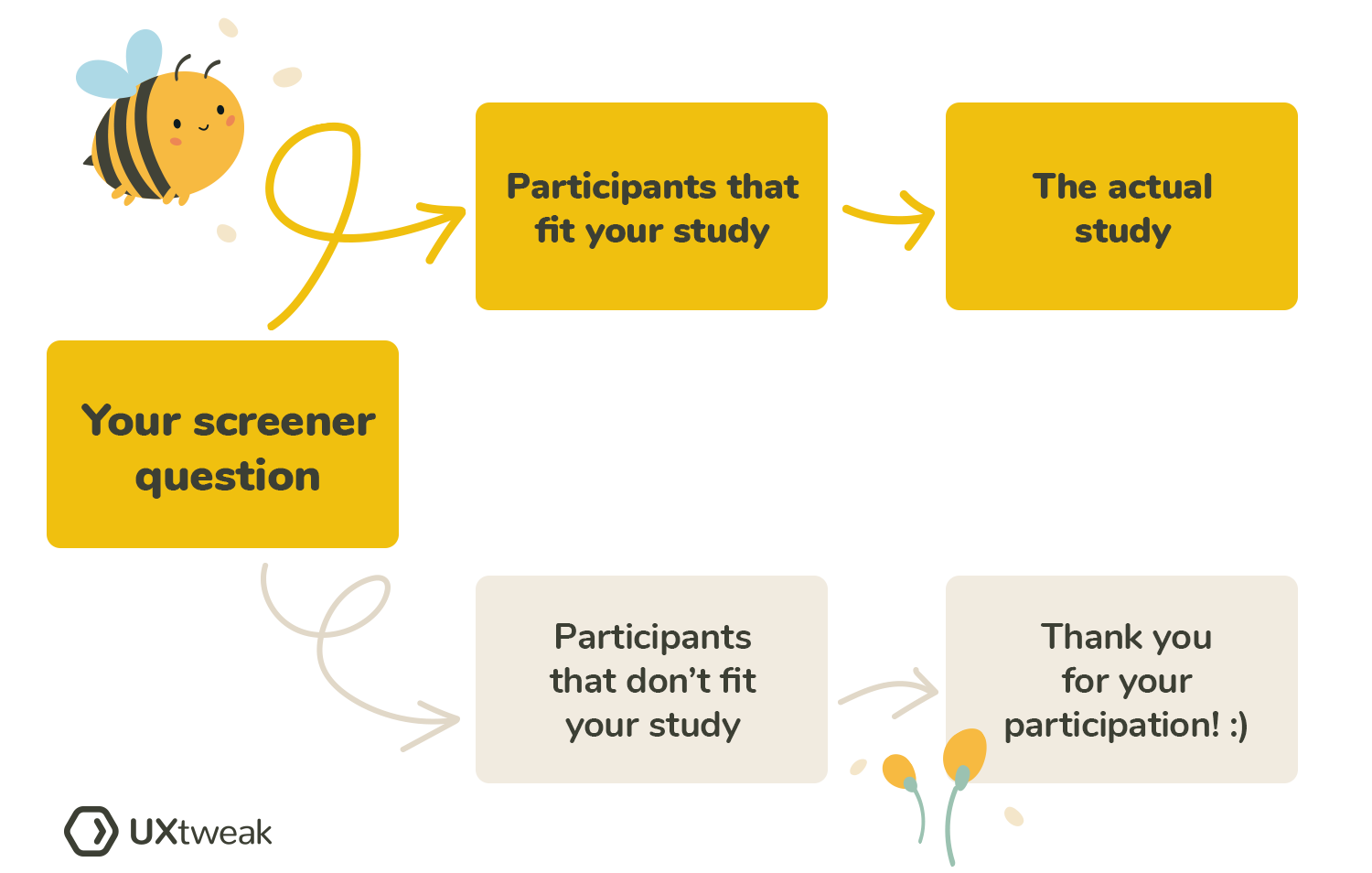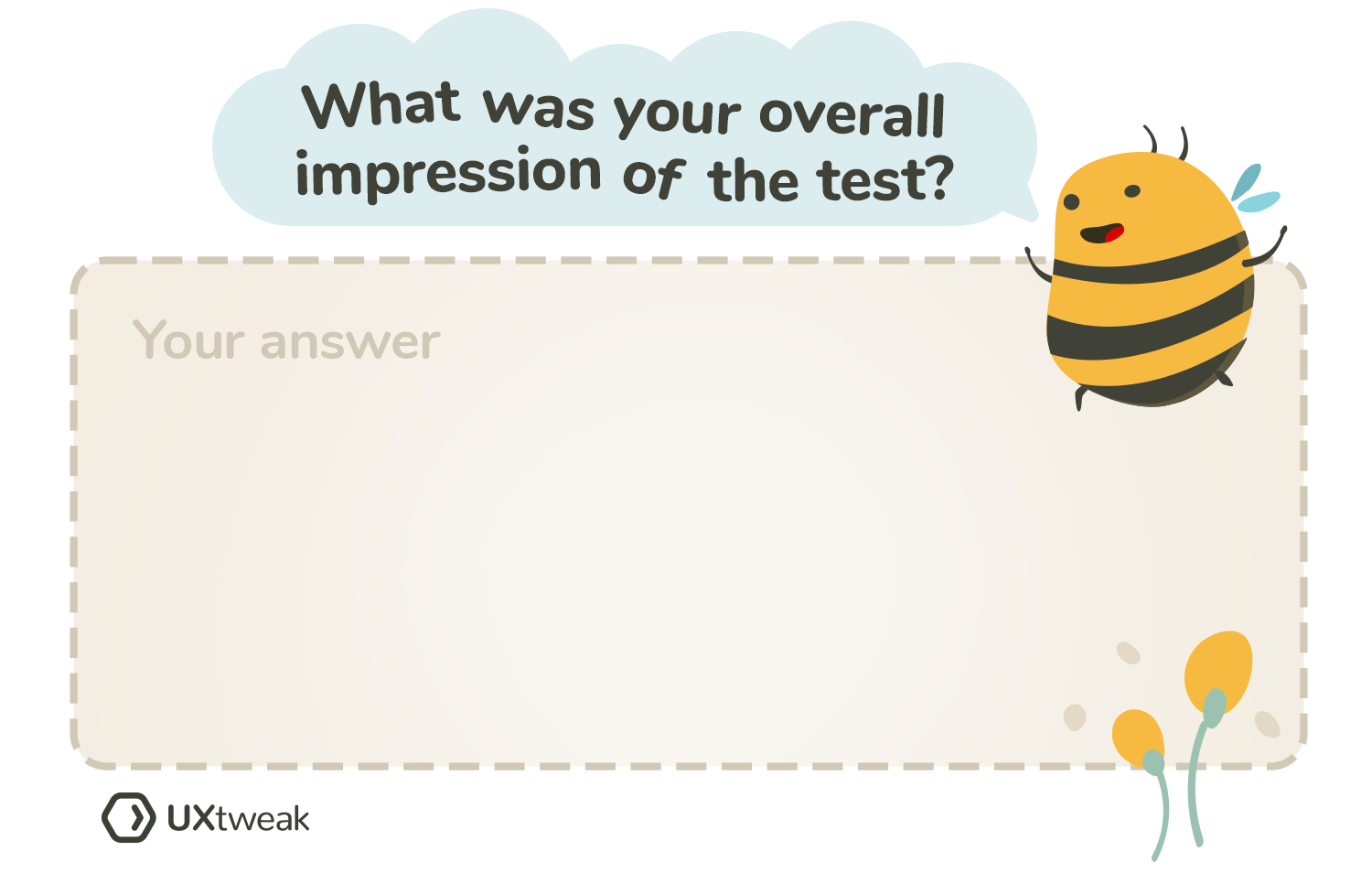The key to an insightful study is a set of carefully thought-through questions that correlate to your project’s goals. Today we’ll take a look at 4 common types of UX research questions and their examples.
Why is it important to ask good UX research questions?
UX research questions are one of the key parts of your research, and when used right can bring out all the important details you miss during the study itself. They help you gather additional information, allow testers to share their opinions and concerns and are just a great way of gathering feedback before, during and after the study.
We recommend to plan out your questions ahead and include them into your UX research plan. This way you can make sure to not forget anything and won’t change the questions going from one participant to another.
A great advantage of UX research tools like UXtweak is that they allow you to insert those questions during the study setup process, no matter what UX research method you choose.
This comes in handy especially when conducting an unmoderated user test, with no researcher present to ask the questions. This saves you tons of time as there is no need to prepare a separate questionnaire each time and send it out to the participants before and after the study.
Types of UX research questions
There are different types of questions you may want to ask depending on the part of the study you’re in, the goals of your research etc. However, the questions also differ in their subject.
Some of them will be questions about the participants themselves. You might want to know their background before the study, get to know them better in order to understand how they think and approach certain tasks dealing with your product.
There are also questions concerned about the problem you’re trying to solve. These are usually asked at the earlier stages of user research, during its generative phase. They are focused on uncovering the pain-points and the needs of your future users in relation to the digital product you’re creating. How can it make their lives easier? Which one of their problems is it going to solve and how?
The last group of questions are those about the product. With their help you can find out more about users’ thoughts on product’s design, usability and functionality. Those questions will help to figure out if you’re actually solving the user’s problem and discover ways in which you can do it even better.
During the different stages of your study you’ll need to ask different questions so let’s take a look at the 4 different question types based on the stages of your UX research:
- Screeners
- Pre-study questions
- Intra-study questions
- Post-study questions
Screeners
Screening questions are essential in most of the UX research studies as they help to filter out the respondents that are not representative of your target audience. This is important in order to not skew the results analytics later on. One screener is usually more than enough but in some cases your study might need more.
Write your screening questions with the target audience in mind. For example, if you’re testing an e-commerce clothing store your participants should definitely have an experience of purchasing clothes online.
A good question in that case would be:
How often do you shop for clothes online?
- A) Weekly
- B) Monthly
- C) Every couple of months
- D) Hardly ever
- E) Never
In an online UX research tool like UXtweak, you can set up that the participants who choose options D or E will be redirected to the thank you page and the tool will not let them complete the study.
Pre-study questions
Before the study is the perfect time to get to know your respondents better, ask questions about their demographics, background with the product and any kind of previous experiences related to the study.
Following up on our example with an online clothing store, here are some examples of pre-study questions:
- What is your current occupation?
- How often do you shop online?
- Are you familiar with this brand?
- When you shop online, what is the most important feature for you to have on the website?
- What other websites do you usually buy from? What do you like/dislike about them?
Intra-study questions
The purpose of intra-study questions is to get additional information about users actions and decisions during the test and motivate them to verbalize their opinions. Here, you can ask them to explain why they took a certain action, get feedback on specific features of the product and get their honest opinion on what they’d wish to improve.
Examples of intra-study questions:
- What did you expect to happen when clicking on this item?
- How hard was it for you to complete the task? (1 = very difficult, 5 = very easy)
- What is your opinion on the product’s design?
- Do you find this feature helpful or unhelpful?
- What do you think of …
- If you were looking for …, where would you expect to find it?
Post-study questions
After the study you can ask about the participant’s overall impressions of the test and the product, their opinion on the task difficulty. Ask if they’d use that product in real life or if they would recommend it to a friend. It’s also a perfect time to ask them questions that would generate new ideas for improvement.
Examples of post-study questions:
- What is your overall impression of the test?
- How would you rate the difficulty of using this app on a scale? (1 = very difficult, 5 = very easy)
- What did you like the most/the least about the app?
- Did you feel confused at any point? If so, explain what happened.
- On the scale from 1 to 5 (1 = very satisfied, 5 = very dissatisfied) how would you rate your experience with the product?
- Is there anything a product lacks in your opinion?
- If you could add one feature, what would it be?
In case you are interested in learning more about all of these types of questions and hearing useful tips on when to ask them, we recommend you to watch a video from our YouTube channel where we discuss it all:
Check out our list of best UX Research tools where we explain the pros and cons of each tool and help you choose the best one for your research!



